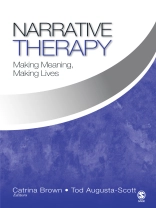‘This volume is especially useful in demonstrating the effects of placing social discourses at the center of therapy. It gores many sacred cows of the larger modernist therapeutic community, but in doing so it offers new ideas for mental health professionals attempting to help their clients with common and serious life problems.’
—PSYCRITIQUES
‘This compilation is an insightful read for practitioners who have not taken the opportunity to use narrative therapy in practice…Experienced practitioners will certainly appreciate the theoretical analysis offered by the writers as well as the opportunity for reflective practice. Narrative Therapy is a meaningful contribution to a Canadian book market lacking in clinical literature for social workers’ —CANADIAN ASSOCIATION OF SOCIAL WORKERS
Narrative Therapy: Making Meaning, Making Lives offers a comprehensive introduction to and critique of narrative therapy and its theories. This edited volume introduces students to the history and theory of narrative therapy. Authors Catrina Brown and Tod Augusta-Scott situate this approach to theory and practice within the context of various feminist, post-modern and critical theories. Through the presentation of case studies, Narrative Therapy: Making Meaning, Making Lives shows how this narrative-oriented theory can be applied in the client-therapist experience. Many important therapeutic situations (abuse, addictions, eating disorders, and more) are addressed from the narrative perspective.
Rooted in social constructionism, and emerging initially from family therapy, narrative therapy emphasizes the idea that we live storied lives. Within this approach, the editors and contributors seek to show how we make sense of our lives and experiences by ascribing meaning through stories which themselves arise within social conversations and culturally available discourses. Our stories don’t simply represent us or mirror lived events; they actually constitute us—shaping our lives as well as our relationships.
Narrative Therapy will be a valuable supplemental textbook for theory and practice courses in departments of Counseling and Psychotherapy and of Social Work as well as for courses in Gender and Women Studies.
قائمة المحتويات
Acknowledgments
Introduction: Postmodernism, Reflexivity, and Narrative Therapy – Catrina Brown, Tod Augusta-Scott
PART I: WRITING IN THE SOCIAL
Ch 1. Situating Knowledge and Power in the Therapeutic Alliance – Catrina Brown
Ch 2. Re-storying Women′s Depression: A Material-Discursive Approach – Michelle N. Lafrance, Janet M. Stoppard
Ch 3. The Blinding Power of Genetics: Manufacturing and Privatizing Stories of Eating Disorders – Karin Jasper
Ch 4. Poetics of Resistance: Compassionate Practice in Substance Misuse Therapy – Colin James Sanders
Ch 5. Practicing Psychiatry Through a Narrative Lens: Working With Children, Youth, and Families – Normand Carrey
PART II: SELF-SURVEILLANCE: NORMALIZING PRACTICES OF SELF
Ch 6. Discipline and Desire: Regulating the Body/Self – Catrina Brown
Ch 7. Watching the Other Watch: A Social Location of Problems – Stephen Madigan
Ch 8. Internalized Homophobia: Lessons From the Mobius Strip – Glenda M. Russell
PART III: CHALLENGING ESSENTIALISM
Ch 9. Dethroning the Suppressed Voice: Unpacking Experience as Story – Catrina Brown
Ch 10.Conversations With Men About Women′s Violence: Ending Men′s Violence by Challenging Gender Essentialism – Tod Augusta-Scott
Ch 11. Challenging Essentialist Anti-Oppressive Discourse: Uniting Against Racism and Sexism – Tod Augusta-Scott
PART IV: RE-AUTHORING PREFERRED IDENTITIES
Ch 12. Movement of Identities: A Map for Therapeutic Conversations About Trauma – Jim Duvall, Laura Beres
Ch 13. Letters From Prison: Re-authoring Identity With Men Who Have Perpetrated Sexual Violence – Tod Augusta-Scott
Ch 14: Talking Body Talk: Blending Narrative and Feminist Approaches to Therapy – Catrina Brown
About the Editors
About the Contributors
عن المؤلف
Tod Augusta-Scott, M.S.W. is the program coordinator at Bridges – a domestic violence counselling, research, and training institute in Truro, Nova Scotia, Canada. He has taught at the School of Social Work at Dalhousie University in Halifax. He works as a consultant on issues of domestic violence for both government and non-government organizations. He is currently an editor for the Canadian Journal of Social Work. He publishes and presents his work internationally. His practice focuses primarily on issues of violence, sexual abuse, sexism, racism, and homophobia.












